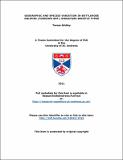Geographic and species variation in bottlenose dolphin (Tursiops spp.) signature whistle types
Abstract
Geographic variation in the whistle vocalisations of dolphins has previously been reported. However, most
studies have focused on the whole whistle repertoire, with little attempt to classify sounds into biologically
relevant categories. Common bottlenose dolphins (Tursiops truncatus) use individually distinctive signature
whistles which are thought to help maintain contact between conspecifics at sea. These whistles may show a
different kind of variation between populations than non-signature whistles. Here I investigate signature
whistle use and variation in the two recognised species of bottlenose dolphins (T. truncatus and T. aduncus)
from populations inhabiting the coastal waters of the North America, Scotland, South Africa, Tanzania,
Japan, Australia and New Zealand, and one captive colony. I identified likely signature whistles (signature
whistles types, SWTs) from acoustic recordings by combining two novel techniques: automated contour
categorisation in ARTwarp (Deecke and Janik, 2006) and a specific bout analysis based on the timing of
signature whistle production in T. truncatus termed SIGID (Janik et al. in press). Three ways of categorising
the contours were tested and between 87 and 111 SWTs were identified in total. Repeated emissions of
stereotyped contours were apparent in the repertoire of all T. aduncus populations using both automated and
human observer categorisation, providing good evidence for signature whistle use in this species. There was
significant inter-specific variation in the frequency parameters, looping patterns and duration of SWTs.
Inflection points, duration and measures of SWT complexity showed high variation within populations,
suggesting inter- and intra-individual modification of these parameters, perhaps to enhance identity encoding
or convey motivational information. Using 328 bases of the mtDNA control region, I found high levels of
population differentiation (FST and φST) within the genus Tursiops. These data do not support a link between
mtDNA population differentiation and variability in call type. Instead, morphological variations at the
species level, and learned differences at the population level, better explain the variation found.
Type
Thesis, PhD Doctor of Philosophy
Collections
Items in the St Andrews Research Repository are protected by copyright, with all rights reserved, unless otherwise indicated.

